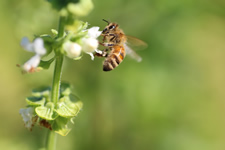
Team of Researchers Study the Ecology of a New GM Crop
July 13, 2016| |
 A team of researchers led by University of Connecticut (UConn) plant scientist Carol Auer is studying the interactions between Camelina sativa, a new genetically modified crop and the environment. Auer and her team have been gathering information about Camelina, an oilseed crop that has never been grown commercially in Connecticut. Camelina has been subject to genetic modification to make products such as biofuels, dietary supplements, and bioplastics, and could become popular with farmers in the U.S.
A team of researchers led by University of Connecticut (UConn) plant scientist Carol Auer is studying the interactions between Camelina sativa, a new genetically modified crop and the environment. Auer and her team have been gathering information about Camelina, an oilseed crop that has never been grown commercially in Connecticut. Camelina has been subject to genetic modification to make products such as biofuels, dietary supplements, and bioplastics, and could become popular with farmers in the U.S.
The study's main goal is to understand gene flow, the movement of genes between individual plants within a species or between closely related plant species. Gene flow between plants depends upon the movement of pollen by wind or insects, and the fields at UConn have clearly shown that Camelina attracts pollinators such as honey bees, native bumble bees, and flies.
Over the next few years, the research team will share information they have gathered about Camelina gene flow and weed dynamics with farmers and other stakeholders.
More details are available at UConn Today.
| |
Biotech Updates is a weekly newsletter of ISAAA, a not-for-profit organization. It is distributed for free to over 22,000 subscribers worldwide to inform them about the key developments in biosciences, especially in biotechnology. Your support will help us in our mission to feed the world with knowledge. You can help by donating as little as $10.
-
See more articles:
-
News from Around the World
- Biotech Scientists and Communicators Discuss Strategies to Strengthen Knowledge Sharing
- New Discoveries to Help Scientists Harness Power of Photosynthesis
- Survey Shows Vermont GMO Labeling Mandate Misleads Consumers
- Team of Researchers Study the Ecology of a New GM Crop
- U.S. Senate Passes Biotech Labeling Bill
- Researchers Identify Characteristics Improving Bean's Resistance to Drought
- New Study Shows How Plants Sense Electric Fields
-
Research Highlights
- Researchers Find Overlapping QTL for Stomatal Traits and Yield in Wheat
- Botrytis-Induced Kinase1 Negatively Regulates Phosphate Homeostasis in Arabidopsis
-
Beyond Crop Biotech
- Maleness Gene in Mosquito Discovered; Could Enable Genetic Control of Malaria
- USDA Scientists Decode Genome of Cacao's Fungal Pathogen
- Hokkaido University Researchers Develop CRISPR/Cas9-Based Method for Gene Activation
-
Announcements
- Genomics and Bioinformatics
-
Resources
- ACB Releases GM Soya Report in South Africa
- Voices and Views: Addressing Biotech Critics
-
Read the latest: - Biotech Updates (January 21, 2026)
- Gene Editing Supplement (January 28, 2026)
- Gene Drive Supplement (February 22, 2023)
-
Subscribe to BU: - Share
- Tweet
